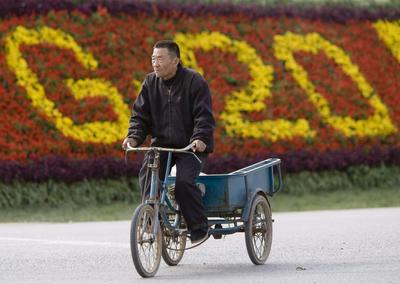Developing economies now account for around 40 per cent of global GDP and their share is expected to continue rising in the coming years. The Asian economy is projected to take up one half of global production by 2050, given its current pace of growth. This has led many economists and futurists to predict that the centre of gravity for the global economy will shift toward Asia. In fact, that shift is already taking place.
Asia has shown a strong presence at all stages of the G20 process during the global economic crisis, from its first meeting in Washington DC in 2008 to the Seoul Summit last year. While the international community as a whole has been active in cooperating on policies to overcome the crisis and in drawing the basic blueprint for global economic governance, the actions of the Asian countries in this effort were vital. The weight and influence that Asian countries brought to bear was felt throughout every major issue on the agenda, including the resolution of global imbalances, the reform of international financial institutions, the creation of a global financial safety net and deliberations on development issues.
Needless to say, maintaining the vitality of the G20 as the world’s premier economic forum hinges on the continuing and dynamic role of Asian economies. This is underscored by the fact that Asia is home not only to the world’s second and third largest economies, but also to 60 per cent of the world’s population. The region also holds more than half of the world’s foreign exchange reserves.
Asia’s status in the world economy is unique in that, although it is a major contributor to the global imbalance, it is also in the best position to provide a solution to the problem. The G20 devoted the greatest amount of energy to the issue of global imbalances because it was the most important and difficult one facing the forum. American consumerism can be readily pointed out as a major contributing factor, but the division of production now firmly established within the structure of the Asian economy must take an equal share of the blame.
The structure of the Asian economy involves tariff-free or low-tariff export of raw materials or intermediate goods from Korea, Japan and Southeast Asia to China. They are then processed or assembled in China for export to the US or Europe, thereby adding to the global imbalance. An earnest reform of such trade or production structures is no doubt essential for relieving the pervasive global imbalance. This reform could be realised through trade liberalisation among the countries in the Asian region, with complete removal of tariffs and non-tariff barriers — not just for raw materials and intermediate goods but for finished products as well.
Another remedy for the imbalance would be strengthening monetary cooperation among Asian economies to promote greater stability of financial markets in the region. This would alleviate strong tendencies by individual countries to accumulate foreign exchange reserves. In this regard, the multilateralised Chiang Mai Initiative (CMIM) regime established among East Asian economies needs to be strengthened and expanded further.
Asian countries are expected to play a more active role on the issue of development, a matter of great importance for the G20 and the world. It is worth noting that Asia is a region where major aid donors and recipients coexist. In the region there are OECD Development Assistance Committee (DAC) members such as Korea and Japan, emerging economies like China and India that are leaders in south–south cooperation, and recipients of large international aid like some Southeast Asian countries. The creation of an effective regime for cooperation on regional development in Asia will most likely lead to improvements in global regimes for aid and development.
It was through sheer determination and effort as well as economic growth that Asian economies have attained their place in the sun. But as Asian economies are now being asked to assume a more active role in the decision-making processes of the G20 on important global issues, they are coming under increasing pressure to improve their political and economic capacity. In order to achieve this requirement they will need to strengthen their respective market systems and democratic institutions.
Wook Chae is President of the Korea Institute for International Economic Policy (KIEP) and has served as a member of the National Economic Advisory Council, Seoul.
This article appeared in the most recent edition of the East Asia Forum Quarterly, ‘Asia’s global impact‘.


Reading this article gives me an impression that it was not the Europe or the USA but Asia that is in deep trouble, or the world’s main economic or finanical woes.
Does it mean that Asia would be better off to be in their situations, or should learn from and become the former in the current system?
I was wondering whether the assessment or diagnose is correct or right.